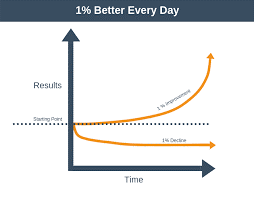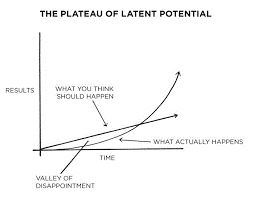I am currently reading Atomic Habits by James Clear and believe there are lessons in the book for all school leaders. Clear’s key message is that “Success is the product of daily habits, not once in a lifetime transformations.” I believe that this is the key to school effectiveness. Whilst many schools pursue change strategies to transform their school, it is the daily habits that learners experience that ultimately impact on learning outcomes.
Ultimately, your habits matter because they help you become the type of person you wish to be. They are the channel through which you develop your deepest beliefs about yourself. Quite literally, you become your habits. For schools, the habits or routines or activities and priorities that we allocate time to, become the school we wish to be.
 According to Clear, habits are the compound interest of self-improvement. If you can get 1% better each day for one year, you’ll end up 37 times better by the time you’re done.
According to Clear, habits are the compound interest of self-improvement. If you can get 1% better each day for one year, you’ll end up 37 times better by the time you’re done.
Your outcomes are a lagging measure of your habits. Your net worth is a lagging measure of your financial habits. Your weight is a lagging measure of your eating habits. Your clutter is a lagging measure of your cleaning habits. Your knowledge is a lagging measure of your learning habits.
I would therefore suggest the learning outcomes your school achieves are a lagging measure of your school’s programs and strategies. You should be far more concerned with your current trajectory than with your current results.
One of the challenges of changing habits is that it doesn’t feel like you are going anywhere. It’s a hallmark of any compounding process: the most powerful outcomes are delayed. This is what James Clear calls the Plateau of Latent Potential. This is one of the core reasons why it is so hard to build habits that last. People expect to see change quickly and when the outcomes don’t change quickly enough they give up on the new habit, too early. You aren’t going to ‘see’ any difference in your body after going for one jog around the block or even after going for a jog around the block three times a week for a month. Our expectations of what we think should happen are higher than what actually happens. This gap creates what is known as the Valley of Disappointment and can lead to us dropping our new habits before they actually have impact.
 Habits often appear to make no difference until you cross a critical threshold. Time magnifies the margin between success and failure. It will multiply whatever you feed it. Good habits make time your ally. Bad habits make time your enemy.
Habits often appear to make no difference until you cross a critical threshold. Time magnifies the margin between success and failure. It will multiply whatever you feed it. Good habits make time your ally. Bad habits make time your enemy.
“Forget about goals, focus on systems instead,” is the advice of Clear in describing how people should work on changing their habits to those that are more helpful. He says, “Goals are about the results you want to achieve, systems are about the process that leads to those results. Goals are good for setting a direction but systems are best for making progress.” For example, increasing the percentage of students in the upper two bands on a NAPLAN assessment, sets the direction but what are the systems that need to be in place to make progress in that area.
“You do not rise to the level of your goals. You fall to the level of your systems. If you want better results, then forget about setting goals. Focus on your system instead.”
So what are the systems in your classrooms? What habits need to be evident in EVERY classroom, every day?
What are the non-negotiables that should be evident in every prep classroom for example?
… or every Year 7 maths class?
… or every Science lesson?
… or every time a behaviour incident is addressed?
Ensuring that these baseline expectations are clear and are evident across the school will ensure that we have systems in place to ensure that we continue to make progress in the right direction.

